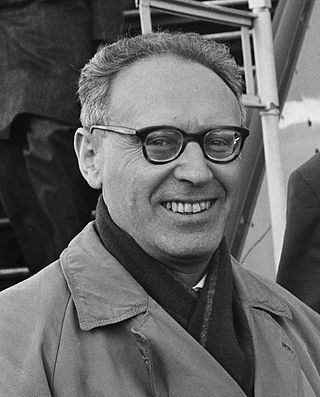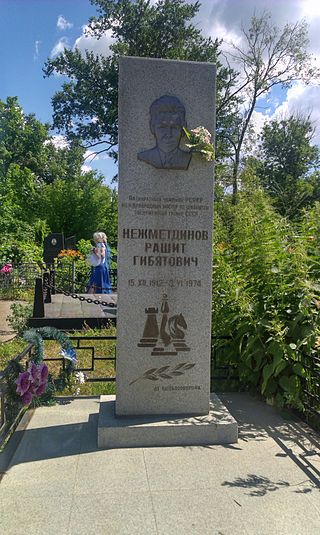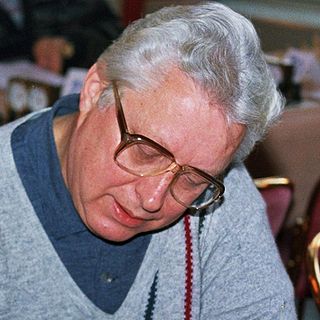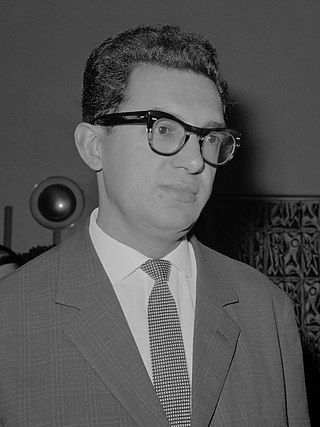
The World Chess Championship is played to determine the world champion in chess. The current world champion is Gukesh Dommaraju, who defeated the previous champion Ding Liren in the 2024 World Chess Championship.

Mikhail Nekhemyevich Tal was a Soviet and Latvian chess player and the eighth World Chess Champion. He is considered a creative genius and is widely regarded as one of the most influential players in chess history. Tal played in an attacking and daring combinatorial style. His play was known above all for improvisation and unpredictability. Vladislav Zubok said of him, "Every game for him was as inimitable and invaluable as a poem".

Mikhail Moiseyevich Botvinnik was a Soviet and Russian chess grandmaster who held five world titles in three different reigns. The sixth World Chess Champion, he also worked as an electrical engineer and computer scientist and was a pioneer in computer chess. He also had a mathematics degree (honorary).

Vasily Vasilyevich Smyslov was a Soviet and Russian chess grandmaster who was the seventh World Chess Champion from 1957 to 1958. He was a Candidate for the World Chess Championship on eight occasions. Smyslov twice tied for first place at the USSR Chess Championships, and his total of 17 Chess Olympiad medals won is an all-time record. In five European Team Championships, Smyslov won ten gold medals.

The USSR Chess Championship was played from 1920 to 1991. Organized by the USSR Chess Federation, it was the strongest national chess championship ever held, with eight world chess champions and four world championship finalists among its winners. It was held as a round-robin tournament with the exception of the 35th and 58th championships, which were of the Swiss system.

Paul Keres was an Estonian chess grandmaster and chess writer. He was among the world's top players from the mid-1930s to the mid-1960s, and narrowly missed a chance at a World Chess Championship match on five occasions. As Estonia was repeatedly invaded and occupied during World War II, Keres was forced by the circumstances to represent the Soviet Union and Nazi Germany (1941–44) in international tournaments.

Leonid Zakharovych Stein was a Soviet chess Grandmaster from Ukraine. He won three USSR Chess Championships in the 1960s, and was among the world's top ten players during that era.

Alexander Alexandrovich Kotov (Алекса́ндр Алекса́ндрович Ко́тов; was a Soviet chess grandmaster and author. He was a Soviet chess champion, a two-time world title Candidate, and a prolific writer on the subject of chess. Kotov served in high posts in the Soviet Chess Federation, and wrote most of his books during the Cold War. The importance and breadth of Kotov's work rank him among the all-time greats in this field.

Jaan Ehlvest is an Estonian-American chess player. He was awarded the title Grandmaster by FIDE in 1987. Ehlvest was Estonian champion in 1986. Since 2006, he has represented the United States.

Rashid Gibyatovich Nezhmetdinov was a Soviet chess player, chess writer, International Master and checkers player. Although he never attained the title of Grandmaster, he was a renowned tactician and created several brilliant games. Biographer Alex Pishkin compares him to Chigorin, Réti and Spielmann.

Igor Zakharovich Bondarevsky was a Soviet Russian chess player, trainer, and chess author. He held the title of Grandmaster in both over-the-board and correspondence chess. Bondarevsky shared the 1940 Soviet title, and later coached World Champion Boris Spassky.
This is a list of all the winners of the Ukrainian Chess Championship, including those held when Ukraine was a Soviet republic and those held after Ukraine became independent. Players' names listed in parentheses indicate that the player won the tournament but did not receive the title since he was an outside competitor. The title went instead to the top-scoring Ukrainian.
The Russian Chess Championship has taken various forms.

Evgeni Andreyevich Vasiukov was a Russian chess player, one of the strongest in the world during his peak. He was awarded the title of Grandmaster by FIDE in 1961. During his career, he won the Moscow Championship on six occasions and scored numerous victories in international tournaments, such as Belgrade Open 1961, Moscow International 1961, East Berlin 1962, Reykjavik 1968, and Manila 1974. He was rarely at his best in Soviet Championship Finals, which were among the very toughest events in the world, and never made the Soviet team for an Olympiad or a European Team Championship. Vasiukov won the World Senior Chess Championship in 1995.
Vladimir Alexeyevich Alatortsev was a Soviet chess player, author, and administrator. During his career, he became champion of both Leningrad and Moscow, and played in the Soviet Chess Championship finals nine times, with his best competitive results in the 1930s. He placed clear second in the 1933 Soviet final. He retired from most competitive play in the early 1950s, moving into roles as a chess organizer, teacher, and coach. He served as chairman of the All-Union chess section from 1954 to 1959 and as chairman of the USSR Chess Federation from 1959 to 1961. By profession, he was a hydraulics engineer.

Vladimir Konstantinovich Bagirov was a Soviet-Latvian chess player, author, and trainer. He played in ten USSR Championships, with his best result being fourth place in his debut in 1960. Bagirov was world senior champion in 1998.
The first unofficial Lithuanian Chess Championship was held in Kaunas in 1921. The Champion's title was granted after victorious or drawn match between previous champion and challenger, mostly a winner of Championship of Kaunas in the period from 1922 to World War II. The first official Lithuanian championship was held in 1929. The next year, Lithuania joined FIDE, the World Chess Federation.
Following are the official winners of the national Georgian Chess Championships from 1928 to date. Until 1990 the Georgian Soviet Socialist Republic was a republic within the Soviet Union.

The 29th Chess Olympiad, organized by FIDE and comprising an open and a women's tournament, as well as several other events designed to promote the game of chess, took place between November 16 and December 4, 1990, in Novi Sad, Yugoslavia.

The 1961 Soviet Chess Championship - 28th edition was held from 11 January to 11 February 1961 in Moscow. The tournament was won by Tigran Petrosian. The final were preceded by semifinals events at Odessa, Rostov and Vilnius. This was also a Zonal tournament with four Interzonal places on offer. 1961 was the year of two Soviet Chess Championships, the 28th and the 29th editions.















